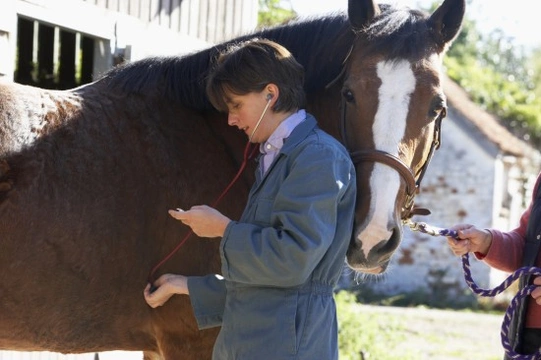
Pre-Purchase Vetting a Horse Will Show Up a Heart Condition
When buying a horse, it's really important to have them vetted especially if you are hoping to show and compete with them. You may well fall in love with a horse, go to view them so you can put them through their paces which leaves you feeling very positive about your choice. However, there are certain conditions the horse may be suffering from which you could be unaware of and this includes certain heart conditions.
Scheduling a pre-purchase vetting will give you peace of mind, especially should the horse be suffering from some sort of heart condition. Over recent times, there's been a lot of press about horses suddenly dropping dead after having competed and after being given any strenuous exercise which has bought heart issues in the equine world into the limelight.
Heart Conditions Can be Detected During a Vetting
A vet would want to examine the horse for all other health issues too, but they normally start by listening to a horse's heart, their lungs and then checking out their eyes. By listening to the heart using a stethoscope, a vet would be able to determine whether there's a serious problem or not even when the horse is at rest.
The vet would place the stethoscope on the horse's chest and listen for any heart murmurs and would do so on each side of the chest. Loud murmurs can be heard over normal heart sounds and if the murmurs are of real concern, the vet would end the vetting process right then and there, recommending you don't buy the horse in the process.
A vet would immediately be able to tell if the murmur fills the systolic phase of a heart beat cycle which is when blood is ejected out of the heart and sent on its way around the horse's circulatory system. If the vet detects this, it could be a sure sign the horse is suffering from some kind of very serious congenital heart disorder which could even be a ventricular septal defect.
What is a Ventricular Septal Defect?
A ventricular septal defect is a birth defect where the inner wall in the heart has a hole in it. The wall is called the septum and it is this wall"" that separates the two halves of the heart, namely the left and the right side. It prevents oxygenated blood from mixing with unoxygenated blood. A hole in the wall allows the blood to mix which means the heart has to work that much harder. This could result in the heart eventually failing altogether.
A total cardiac failure could occur at any time and may well appear to be a heart attack. The condition could also come on gradually namely as being congestive heart failure. To confirm a suspected ventricular septal defect a vet would need to carry out an ultrasonography which would not typically be part of a vetting process.
However, if on first examination of a horse's heart, the vet is happy to proceed with the rest of the vetting and depending on the type of vetting you opt to have done, they would then want to check the horse's heart after they have been given strenuous exercise. It is at this stage that a heart defect would be more noticeable even if it is not as serious.
However, no matter how insignificant the heart condition may be when you have a horse vetted, the better it is that you are aware of it because it could be the deciding factor on whether you would want to go on with the purchase. Obviously, the vet's opinion and recommendation would be of paramount importance in whether you would want to take the risk and purchase a horse with a suspected heart condition, no matter how insignificant it may be.
Requesting Ancillary Tests is an Option
After having completed a pre-purchase vetting on a horse that interests you, it is possible to ask the vet to carry out further tests which are not typically included in the package. This is useful because a vet would then be able to do more in-depth tests namely to take an ultrasonography, radiography or and endoscopy.
Sometimes an insurance company would insist these extra tests be carried out on a horse so it is worth finding this out from your insurer before you book a vetting.
What is Required of Owners When Booking a Pre-purchase Vetting
When you book a pre-purchase vetting, there are certain things you would need to supply and things you should do and not do which includes the following:
- Supply the vet with the full name and address of the vendor
- All papers and documentation which includes passports need to be available for the vet to inspect
- Horses much be clean, groomed and stabled for a least three hours prior to a vetting taking place
- Horses need to have had their feet trimmed or been recently shod, but no hoof oil should be applied to the feet before a vetting takes place
- The horse needs to be in a dark stable so a thorough eye examination can be carried out
- A flat and safe surface needs to be available for the horse to be trotted up on which has to be a hard surface and not in a field
- A lunge or schooling area should be made available for the vet to watch the horse being exercised in
- All ancillary tests typically have to be pre-booked with the vet
""



